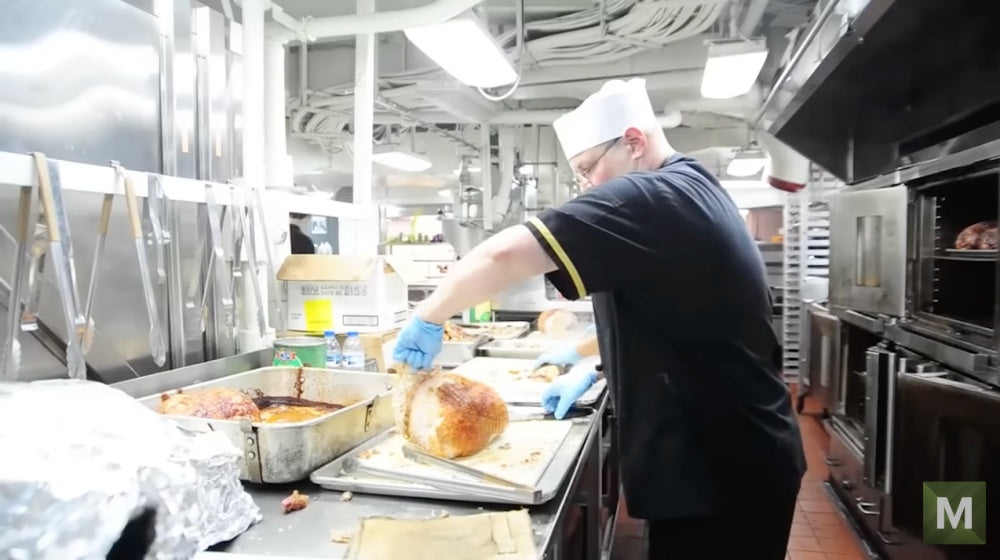This Isn't Your Father's Navy: What Modern Carrier Mess Halls Are Like
Dan Doyle
This video is an informative, interesting, and intense presentation on what might at first seem a boring topic. It's about the incredible complexity of what goes into feeding the 5-6,000 crewmembers of modern Nimitz-class and Ford-class aircraft carriers on a daily basis. As the kitchen is the heart of any home, the galleys on modern carriers are what keep the daily life aboard a modern Navy ship going strong.
Modern Nimitz-class or Ford-class aircraft carriers are some of the most complex machines ever built. They are truly floating cities that bring their own airport wherever they go. They are the centerpieces of modern naval power, capable of bringing immense offensive and defensive power, or humanitarian aid, if or when it is needed, to anywhere in the world with great speed and efficiency. The complexities of these nuclear-powered ships are mind-boggling at every level. In a relatively small space, it has all of the infrastructure needs and complexities that any small city requires to sustain all of its needs. Besides that, they have an entire airwing with planes to maintain, arm, and fly.
 Photo: YouTube/The Military Show
Photo: YouTube/The Military ShowMost of us are somewhat aware of what aircraft carriers do and how complex they must be. But most of us probably don't think of what the daily life of an aircraft carrier might look like. Modern aircraft carriers work efficiently because of the multi-faceted skills of their crews. One of the particular skills that most of us have rarely, if ever, thought about is that of the men and women who feed the 5-6,000 people who live and work on those carriers.
Culinary Specialists are some of the most vital and important members of the carrier's or any ship's crew. Yes, these men and women are responsible for feeding the crews, but how they do it, and the quality of their work, has as much to do with the morale of the ship's crew as anything else aboard the ship. Today's culinary specialists are better trained and are more skilled than at any time before. They understand that food is not just a necessity, but that it can have positive effects on the overall quality of life aboard ship, especially on long deployments.
 Photo: YouTube/The Military Show
Photo: YouTube/The Military ShowThe modern Nimitz-class, nuclear-powered aircraft carriers have five galleys on board, whereas the late aircraft carriers, the Ford-class behemoths, have two, one aft and one forward for the airwing members of the crew. As big as these ships are, there is still a limited amount of space to work with in every aspect of the ship's operations. Just like every other element on board these ships, the ships' gallies require incredible efficiency both in terms of space and the equipment that is needed to support every element of food preparation, cooking, and storage in order to feed thousands of crew members three times a day. You will get an idea of how efficient these galleys are today as well as the level of training and expertise that is demanded of these Culinary Specialists on a daily basis.
The logistics alone are unbelievable. Culinary Specialists aboard one of these carriers can serve up to 17,000 meals per day. In one day, for example, they might prepare, cook, and serve up to 1,600 lbs. of chicken, 160 gal. of milk, 30 cases of cereal, and 350 lbs. of lettuce. One of the estimates that you will hear in the video is how much it costs to feed a crew per day. According to the video, running the mess halls on the carrier USS George H.W. Bush costs $45-65 thousand dollars per day and up to $1.8 million per month. These ships maintain contracts with wholesale vendors in ports for resupply when in port. When at sea, they are resupplied about every week or so by underway replenishment at sea, either by supply ships or by helicopter.
 Photo: YouTube/The Military Show
Photo: YouTube/The Military ShowJunior Culinary Specialists are trained in all of the diverse tasks that go with food preparation, cooking, and serving. The breakfast shift of Culinary Specialists wakes up at 0300 to begin the preparation and cooking of the morning meals. They work 12- to 16-hour shifts and, as you will see, there is never a down moment. They are on the go all the time. The modern carrier can have up to 93 Culinary Specialists aboard, and they are held to very high standards.
The importance of the Culinary Specialist rating is far greater today than in the past. The attention given to the quality of food, and to how well it is cooked and served, has been recognized as a major element in maintaining high morale onboard ship. The variety of meals that can be served is much broader than in the past. It is a fact that these sailors eat well. The food is calorically dense, nutritious, and tasty. The attention given to this element of shipboard life indicates how much the Navy values its sailors.
Enjoy this fast-paced, very informative video. You will learn a lot about the skills and the quality of the modern Navy's Culinary Specialist rating. You will get a real good sense of how important this rating is to the quality of life aboard ship in today's United States Navy.
https://www.youtube.com/watch?v=ttDKnhc0H0g

Dan Doyle is a husband, father, grandfather, Vietnam veteran, and retired professor of Humanities at Seattle University. He taught 13 years at the high school level and 22 years at the university level. He spends his time now babysitting his granddaughter. He is a poet and a blogger as well. Dan holds an AA degree in English Literature, a BA in Comparative Literature, and an MA in Theology, and writes regularly for The Veterans Site Blog.




















